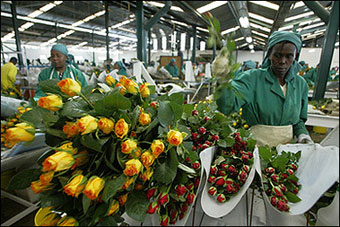Human Flower Project
Riots in Naivasha
Workers on one of Kenya’s largest flower farms rioted and were repulsed by police yesterday; over 1000 workers had been fired for holding an unauthorized strike over a pay cut and alleged corruption.
The whole world is watching Kenya’s flower industry, or should be. Let’s look more closely today: police and workers clashed near Lake Naivasha Monday and hundreds of people have lost their jobs.
“Police fired tear gas and fought running battles on Monday with the workers, who were among more than 1000 employees at the Oserian farm in Kenya’s central Rift Valley fired for participating in (a) strike…Several injuries were reported in disturbances outside the farm.”
The workers claimed to have been docked their monthly Sunday pay and also complained that the company’s education program, for which it had received “fair-trade” designation, has enrolled only the children of the wealthiest workers. Strikers also said that farm managers had dispatched 100 of them to put out a fire, and that 52 workers, untrained as firefighters, had been gravely injured.
The company, claiming the strikers had failed to give the requisite 21 days’ notice before their action, had fired more than 1000 employees.
“The developments come as Oserian, which does major business with the British supermarket chains Tesco, Salisbury and Marks and Spencer, is striving to improve its reputation by joining a Fair trade network.” How fair does all this sound to you?
 Workers packing roses at Oserian farm, Jan. 13
Workers packing roses at Oserian farm, Jan. 13
Photo: Simon Maina, for AFP
Horticultural exports bring in about $100 million to this poor nation’s economy, primarily sales of roses and carnations in Europe. Oserian Farm, 50,000 acres on Lake Naivasha, is one of Kenya’s biggest producers. But increasingly mindful buyers in Europe now want assurances that the good looking produce they’re buying hasn’t come at an exorbitant human cost.
Oserian earned fair-trade certification in 2002 from a company called Max Havelaar, and agreed to set aside 12% of production costs for the welfare of workers. Such certification and compliance are reevaluated annually, renewed or cancelled each year; last year, according to a representative of Max Havelaar, the farm failed to meet “initial specified targets,” particularly in “distributing the bursaries” as mandated.
The market for fair-trade goods has tripled since 2001 and is on the rise. Meanwhile, conditions in and around Naivasha continue to deteriorate. Do shoppers-of-conscience at Tesco influence agribusinesses a continent away? Yes. They do.
Comments
i like to have info about flower prod.as soon as u can


Thanks, Julie, for posting this important story. I’ll be interested to hear what impact this has on the certification process.